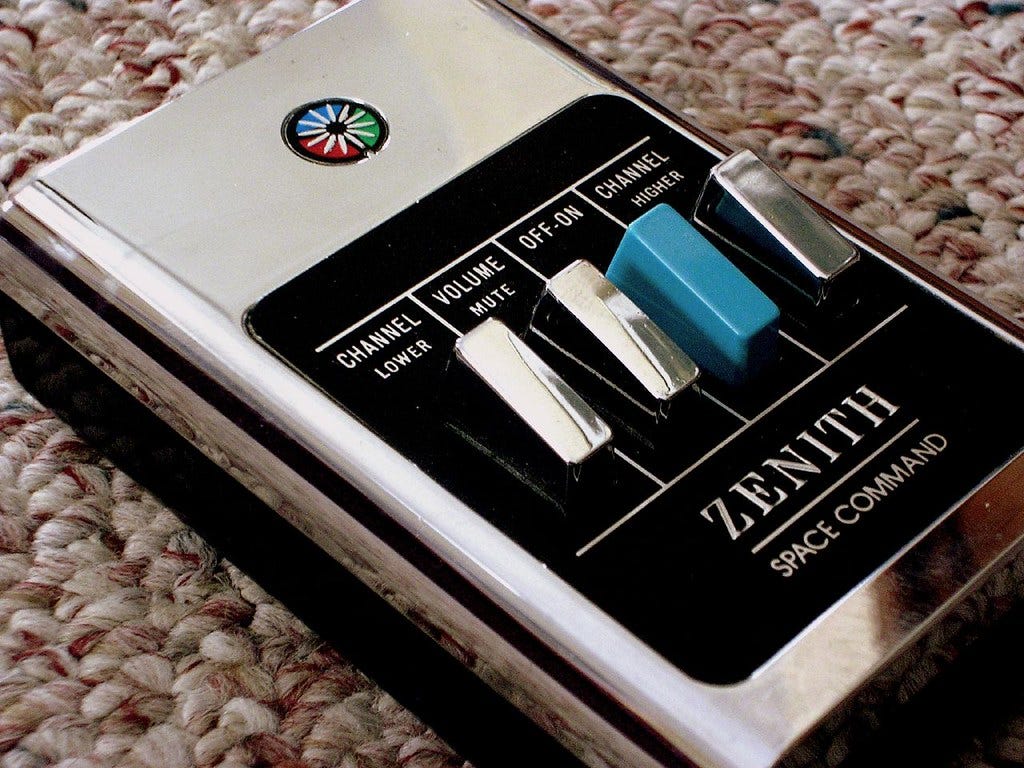Channel Surfing in Uncharted Waters
They said flipping channels would rot our brains, but what we’ve replaced it with is so much worse
Discussed: Austin Butler, channel surfing, cable TV network identities, a great idea for streaming, the surgery channel
Last month, Austin Butler said The Good, the Bad, and the Ugly was his favorite movie as a kid. A TikTok user was dismayed, and encouraged Butler to “just say Toy Story.” It’s part of a larger trend where social media posters accuse celebrities of being pretentious when they say they like movies that aren’t recent mainstream hits.
I could fill this column with examples of content creators’ bad taste or clips that show how the way we talk about culture is fundamentally broken. But one thread from Butler’s defenders1 got me thinking about the effects of one particular change in the way we watch—the end of channel surfing.
It’s not unusual for a kid who grew up in the ‘90s and early 2000s to have seen all kinds of movies on TV. Butler himself has said that cable exposed him to The Good, the Bad, and the Ugly. Two years ago, he told the Los Angeles Times that he and his dad watched Turner Classic Movies every night.
Channel surfing went away with cord cutting, but the mechanics of flipping from station to station are still with us—it’s the infinite scroll. This is a bad replacement. With the algorithmic feed of TikTok or Instagram Reels, we’re fed user-made clips that the app has selected specifically for us, in hopes that we’ll pause for a moment, react, then keep scrolling in the app. Over time, the feed becomes more and more personalized. Channel flipping was like switching between feeds targeted to other people. Networks developed identities to appeal to specific demographics and interests. TCM had old movies. USA had goofy fun. TNT knew drama. Channel surfers flipped past them all. Unless you (or your parents) went through the trouble of blocking channels, there was no way to avoid seeing programming that wasn’t targeted to you.
This is good for developing not only taste, but a sense of history, and even empathy. Channel flipping might start as an act of boredom, but it became an indulgence of curiosity in the wider world. I don’t know how many forgotten movies, bizarre talk shows, strange music videos, and reruns of Law & Order I watched for no reason other than the fact that they were on.
All of this disorganized TV watching shaped me in ways I can’t even begin to unravel here. When you watch programming that isn’t targeted to you, you end up exposed to ideas and images that aren’t meant for you. A theme in the Butler discourse was why a kid would’ve seen such a violent movie. But the thrill of seeing something that seems dangerous is part of the joy of exploration. Rebellion and discomfort are equally likely to be waiting on the next channel. You might find a classic movie or the network that shows open-heart surgery for some reason.
Up to this point, I’ve been comparing cable TV to social media. I think it’s a fair comparison because phones have taken the place of the TV as the top distraction in our lives. But what about the good old TV, what do we have there? A dozen or so streaming services with millions of hours of programs and no clear identity. Yet another algorithm suggests we watch something familiar (old NBC sitcoms are surprisingly resilient in the streaming age) or something so precisely engineered to appeal to us that we’re all but guaranteed not to be challenged.
The friction inherent in channel surfing is gone, and there’s not a clear way to replace it. Netflix has experimented with shuffle mode, but this, too, is algorithmically curated. A true return to channel surfing pleasures can’t be achieved by a single streaming app—the competition between networks was one reason why flipping was so valuable, after all.
Whenever I turn on the TV out of boredom, I think about what it would take to rebuild the surfing experience. I imagine an app that lets you log into all your streaming services, press play, and flip through random shows and movies, none of them playing from the beginning, none of them presented with any knowledge of what I watched before. Maybe I won’t find anything I like, but it sounds better than the alternative—skimming past a long list of titles before giving up and looking at my phone.
Who were correct



